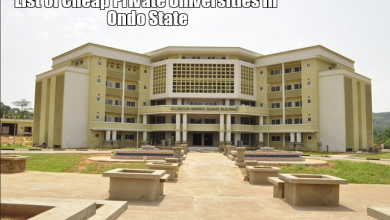Cheapest State Universities in Nigeria and Their Fees
Cheapest State Universities in Nigeria and Their Fees: So you’ve decided it’s finally time to head off to university. That’s great news! The only problem is, university education isn’t cheap, especially if you’re looking at some of the prestigious universities. But don’t worry, Nigeria has some excellent state universities that won’t break the bank. In this article, we’ll explore the cheapest state universities in Nigeria and their estimated tuition fees so you can get a quality education without ending up in lifelong debt. These schools offer competitive programs in fields like engineering, medicine, law, and business. And the best part is, their tuition fees are affordable even if you’re on a budget. So keep reading to discover Nigeria’s cheapest state universities and find your perfect school.
Overview of the State Universities in Nigeria
Nigeria has over 150 universities, with the majority being state-owned. These state universities aim to provide affordable higher education to citizens. Here’s an overview of some of the cheapest state universities in Nigeria and their current school fees.

University of Ibadan
The University of Ibadan is the oldest university in Nigeria.It has over 30,000 students across faculties of agriculture, arts, education, science, social sciences, technology, and more. Annual tuition fees for Nigerian students range from ₦45,000 to ₦65,000 depending on the course of study.
Lagos State University
Lagos State University (LASU) has five campuses across Lagos state with over 60,000 students. It offers programs in arts, education, law, sciences, social sciences, engineering, and medicine. Annual school fees for full-time Nigerian undergraduates are ₦25,000.
Delta State University
Delta State University currently has three campuses with around 30,000 students. It provides education in areas including agriculture, arts, education, science, social science, and management. For Nigerian students, annual tuition fees are ₦50,000 for arts/social science/education students and ₦60,000 for science/agriculture students.
Rivers State University
Rivers State University is located in Port Harcourt, Rivers State. It offers undergraduate and postgraduate programs across faculties of agriculture, education, engineering, law, management, science, and social sciences. Annual tuition for Nigerian students is ₦45,000.
Kaduna State University
Kaduna State University (KASU) opened in 2004 and currently has over 20,000 students across three campuses. It offers programs in agriculture, arts, education, engineering, law, medicine, pharmacy, science, and social sciences. For Nigerian undergraduate students, tuition fees are ₦24,000 per session.
With affordable tuition and a variety of programs, Nigeria’s state universities aim to provide accessible higher education for citizens. By choosing one of these schools, you open up opportunities for career and personal growth at a lower cost.
FAQs
So you’re interested in attending one of the cheapest state universities in Nigeria, but have some questions. Here are the most frequently asked questions and answers to help you out.
How much do state universities in Nigeria cost?
State university fees in Nigeria range from around ₦25,000 to ₦200,000 per year, depending on the school and program. The majority charge between ₦40,000 to ₦120,000 annually for tuition. Additional fees for accommodation, meals, books, and supplies will add to the total cost. However, compared to private universities which can charge ₦300,000-₦500,000 per year, state schools remain the more affordable option.
What are the admission requirements?
To gain admission into a state university undergraduate program, you need:
- At least 5 credits including English Language and Mathematics in not more than 2 sittings in WASSCE/NECO. For some courses like Medicine, requirements are higher.
- Meet the cut-off mark for your course. Cut-off marks vary each year based on available spots. They tend to be lower for state schools compared to federal universities.
- Score well on the Post-UTME screening. Most schools require passing a written screening test. Some also conduct oral interviews.
- Meet additional departmental requirements, if any. Some departments may have extra subject or grade prerequisites.
- Apply through JAMB, the state university website and possibly in person. Follow the application guidelines and submit before the deadline.
How can I fund my education?
There are several options to fund your studies at a state university:
- Government scholarships like the PTDF Scholarship for students in certain courses like Engineering, Geology, Sciences, etc.
- Private scholarships and grants. Many are offered by NGOs, religious organizations, community groups, and businesses. Do research and apply.
- Student loans and payment plans. Some schools offer loans and installment payment options. Interest rates tend to be lower than commercial bank loans.
- Part-time work. Look for part-time jobs, tutoring, teaching assistant roles, or freelance work to generate income during your studies.
- Crowdfunding. Start a campaign explaining your situation and goals to raise donations from individuals. Build a social media campaign to spread the word.
- Family support. See if parents, guardians, or extended family are able to contribute to costs. Even small amounts can help significantly.
Read also:List of all Nursing School in Kano State









